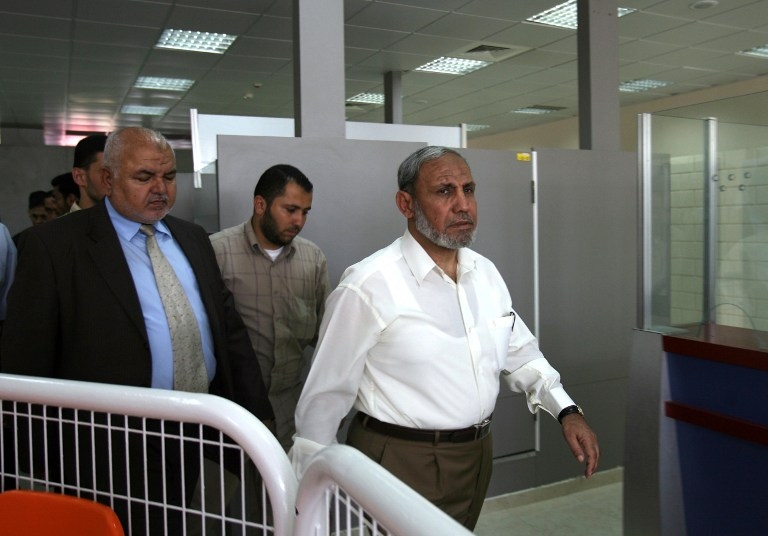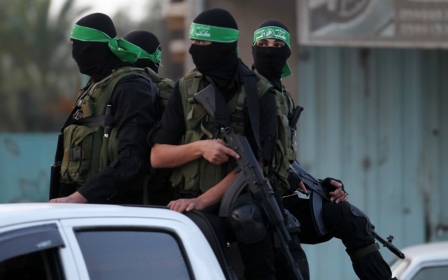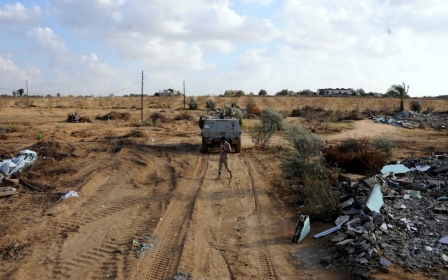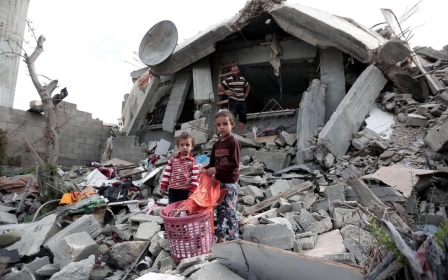Is a Hamas-Egypt rapprochement in the works?

A statement by a top Hamas leader in recent days, along with the temporary opening of the Rafah crossing, indicates that a rapprochement between the group and Egypt, at particular odds since the ouster of Mohammed Morsi and the subsequent destruction of vital tunnels, may be in the works.
In an interview with Khaleej Online on Tuesday, Mahmoud Zahar, a top Hamas leader, said that Egypt was determined to improve and develop relations with his movement, in order to restore what has been destroyed by the overwhelmingly pro-government Egyptian media.
"There are communications between Hamas and senior Egyptian officials that started last week,” Zahar said.
Zahar’s statement comes during one of the darkest periods of history between Hamas and Egypt, one which most analysts say is more strained now than after Hamas’ election in 2006 when Egyptian were under pressure from the US and Israel to destroy the group’s tunnels, according to a 2009 US-Israeli Memorandum of Understanding.
Hamas has been seen as the closest ideological and strategic ally of the Muslim Brotherhood – which is deemed a terrorist organisation by the current Egyptian leadership that removed Morsi, a Brotherhood leader and former Egyptian president, in a July 2013 coup.
Since his overthrow, Egyptian officials have accused Hamas of interfering with security in the restive Sinai Peninsula, a claim which Hamas denies.
Critical Rafah crossing
The day after 31 Egyptian soldiers were killed in two attacks near Sinai-Gaza border town of al-Arish, Egypt closed its Rafah crossing with Gaza on 25 October. The crossing, the only one which does not go through Israel, is a key supply route into the blockaded Strip which is in dire need of reconstruction following this summer’s war with Israel. The closure has stopped vital medical supplies, aid and reconstruction materials from reaching the Strip since a Cairo-brokered truce was signed between Israel and Hamas in August.
On Wednesday, for the first time in a month, the Egyptians opened the border crossing to allow an estimated 6,000 Palestinians to return to the Strip. The opening, though temporary, indicates discussion between the highest levels of the Hamas and Egyptian leaderships, analysts say.
Despite the bad blood, Zahar said in his interview that his movement is now interested in turning over a new page with Egypt.
The statement made by Zahar was welcomed by Gazans like Sami Salah this week.
Salah, a vendor at a market in the southern Gaza of Khan Younis, stressed that a newfound relationship between Hamas and Egypt would allow both sides to benefit.
"We need Egypt - as we are surrounded on all sides by the Israeli occupation. Egypt is the compassionate mother we should not lose," Salah told MEE.
Indeed, despite fresh memories of tense times, there is potentially much to gain from a renewed alliance.
Egyptian troops have been building a buffer zone in the Sinai for months, hoping to destroy the network of underground tunnels that connect Gaza to its neighbour, an effort that has received the blessing of the US and Israel, as well as Egypt’s allies, the United Arab Emirates and Saudi Arabia.
In recent weeks, Cairo has further stepped up its efforts, and has moved to expand the barrier into a 1 kilometre-wide dead zone.
While Egypt insists that the decision to create the buffer was the worsening security situation in Sinai and across its 14 kilometre border with Gaza, from the Gazan perspective, this decision is seen as a political move to crush Hamas.
In his comments, Zahar defensively hammered home the fruitlessness of both the Egyptian buffer which he insisted will hinder “but will not end the programme of resistance” as well as the Israeli blockade.
"Resistance capacity is primarily dependent on self-efforts, and surely when there are open borders with Arab states, then resistance will grow,” he said.
If the blockade was working then how could Hamas have carried out such "a distinguished performance" against the Israeli army during the 51-day war this summer, he asked.
Turning of tide?
This is not the first time that Hamas has shown a willingness to improve relations with Egypt, but the tide might at last be working in favour of a reconciliation.
Gaza-based political analyst Hani Habeeb said that both Egypt and Hamas need one another now more than ever.
“Hamas is facing a political siege and is considering all options to break it,” Habeeb said.
“The success of such sweet talk is dependent on how much Egypt follows this step by opening the border to allow Hamas to continue indirect ceasefire talks in Cairo.”
Indirect ceasefire talks that were being conducted in Cairo were interrupted when Egypt shut down the Rafah crossing in October. Over the years, Egypt has played the role of regional ceasefire-broker, mediating between the two sides during most conflicts between Israel and Hamas.
Gaza political analyst Hamza Abu Shanab said that while the Egyptian media has accused Hamas of being involved in the high-profile attacks in Sinai on 24 October, seemingly justifying the Rafah closure, it is still unclear exactly who was behind them.
"Until this moment, there is no official accusation, and all that is being said in the media are merely reports citing unknown security sources,” Abu Shanab said.
The Sinai attacks ratcheted up a tit-for-tat media war between Hamas and Egypt that started with Morsi’s ouster which sees news pieces and YouTube videos nearly every day that make claims about either side.
Hamas has officially denied that it is actively campaigning against Egypt using press statements. Salah Al-Bardawil, spokesman of Hamas, said last week that the Egyptian government stop its media incitement against Gaza and Hamas, stating that "this is a big mistake that should be corrected.”
Dependency
Media confrontation and the exchange of accusations aside, analysts emphasise that the love-hate relationship between Egypt and Hamas cannot be severed because both sides need one another in the end.
"Hamas needs Egypt as a broker between most treaties with the occupation, and Egypt needs Hamas as the power on the ground which has strength and influence,” said Abu-Shanab.
After this summer’s war and Hamas’ continued political isolation, Habeeb said he believes Egypt is now testing the group’s intentions as communication channels reopen. Both sides, Habeed said, are serious in large part because of their reliance on one another.
Egypt has in hand the only exit for the Hamas leadership from the Gaza Strip, holding the keys to the only door to allies abroad for Hamas’ lobbying and advocacy work.
One destination likely on the minds of Hamas officials is Iran which used to provide financial support to the group. Resources, however, dried up when the Syrian civil war began and Hamas openly sided against Syrian President Bashar al-Assad, one of Iran’s key regional allies.
Hamas’ officials in Gaza have not been able to meet in person with Iranian contacts, making it difficult to rekindle their ties. In his comments last week, Zahar said his movement is interested in restoring and strengthening relationships with the country.
"We are waiting for our Gaza borders to be opened, so we can develop relationships with Iran - the will is there, but the mechanism is currently unavailable," said Zahar.
New MEE newsletter: Jerusalem Dispatch
Sign up to get the latest insights and analysis on Israel-Palestine, alongside Turkey Unpacked and other MEE newsletters
Middle East Eye delivers independent and unrivalled coverage and analysis of the Middle East, North Africa and beyond. To learn more about republishing this content and the associated fees, please fill out this form. More about MEE can be found here.




